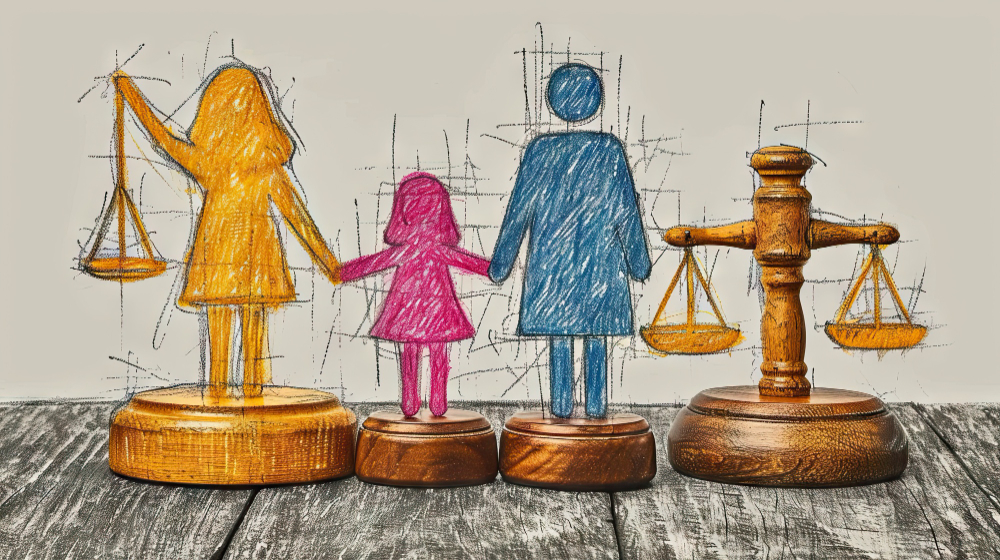There is a complicated overlap between children’s welfare and criminal justice systems, meaning one will likely cause the other. For instance, the goal of child welfare systems includes the well-being, safety, and permanence of children and families. However, national data shows that foster systems fail to support youth adequately.

According to a series of research studies by the University of Michigan, four in ten U.S. children grow up with at least one convicted parent. That is, in households where a parent or co-residing adult spent time in prison, was convicted of a felony, or faced at least one criminal charge. It would seem the system is instead punishing parents by removing them from their children’s lives, thus putting them at risk of future criminal involvement.
US Statistics
“The Bureau of Justice Statistics estimates that less than one in forty children have at least one parent in prison yearly,” says Attorney Christopher Adams of Adams & Bischoff. An assistant professor of economics, Michael Mueller-Smith, stated this observation. Michael Mueller-Smith further said severe data limitations had hampered prior efforts to quantify the extent of justice spillovers and crime in households. Furthermore, he says, federal data collection has been unable to track intergenerational spillovers and capture non-incarceration events within families that leave the nuclear family model. This has resulted in a lack of data on how many kids fall into this category.
Revelations of the Report
According to Mueller-Smith, the fact that the estimates reach close to half of the children in the U.S. is problematic. It should remind the government and justice system about the failures of their public policies. Meanwhile, even if the government succeeded in completely overhauling the justice system today, the damage done will continue for decades to come. Meanwhile, Mueller-Smith and colleagues could access data from the U.S. Census Bureau, Criminal Justice Administrative Records System, and Treasury Department. Through this data, they were able to overcome the data limitations that have put a constraint on this research for years.
Apart from the high rates of intergenerational exposure, researchers also found that child exposure in the U.S. population is heterogeneous. Over sixty percent of Native and Black American children with less-than-median income have twice the rate of white children. According to Brittany Street, many early childhood experiences and circumstances can affect a child in more ways than one. For instance, circumstances in early childhood are vital to the life outcomes a child will experience. The alarming problem is that the model experience for minority U.S. children is due to indirect exposure to the criminal justice system.
Alarming Inferences
Brittany Street is an assistant economics professor at the University of Missouri and co-author of the study. She concluded that the implications of these findings are important for criminal justice policy and overall U.S. social policy. Meanwhile, researchers have established that early life exposure correlates significantly with a range of negative outcomes of child development. These outcomes include cognitive difficulty, teen crime and death by 18 years of age, lagging in school, and teen fertility. These complications can still arise when considering various factors, including age, birthplace, household income, sex, and race.
Furthermore, the justice system is also a major factor in the intergenerational propagation of racial disparities and economic inequality in the United States. Strong evidence, such as estimated relationships with child outcomes, expansive prevalence, and demographic heterogeneity, backs this statement. Economists and researchers from the University of Missouri, the University of Michigan, and the United States Census Bureau performed this research.
Conclusion
The findings of the research study highlight the pressing need for systemic reforms to mitigate the intergenerational impacts of parental criminal convictions on children. Policies must prioritize family preservation where safe and feasible, addressing structural inequalities that disproportionately affect minority and low-income families. Investing in community support systems, educational opportunities, and mental health services for impacted children can help counteract the negative outcomes. Additionally, integrating restorative justice practices may reduce incarceration rates while maintaining family stability. These approaches, combined with improved data collection and research, can inform evidence-based policy decisions, fostering a justice system that balances accountability with compassion and long-term societal benefits.

